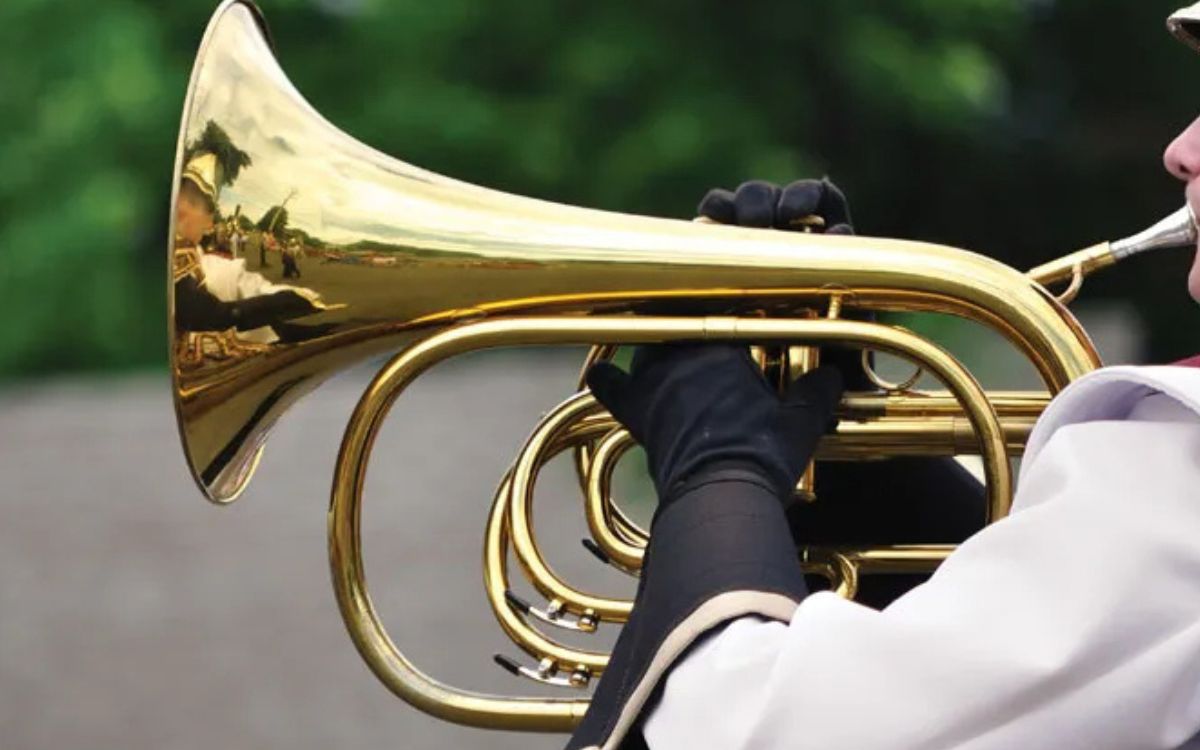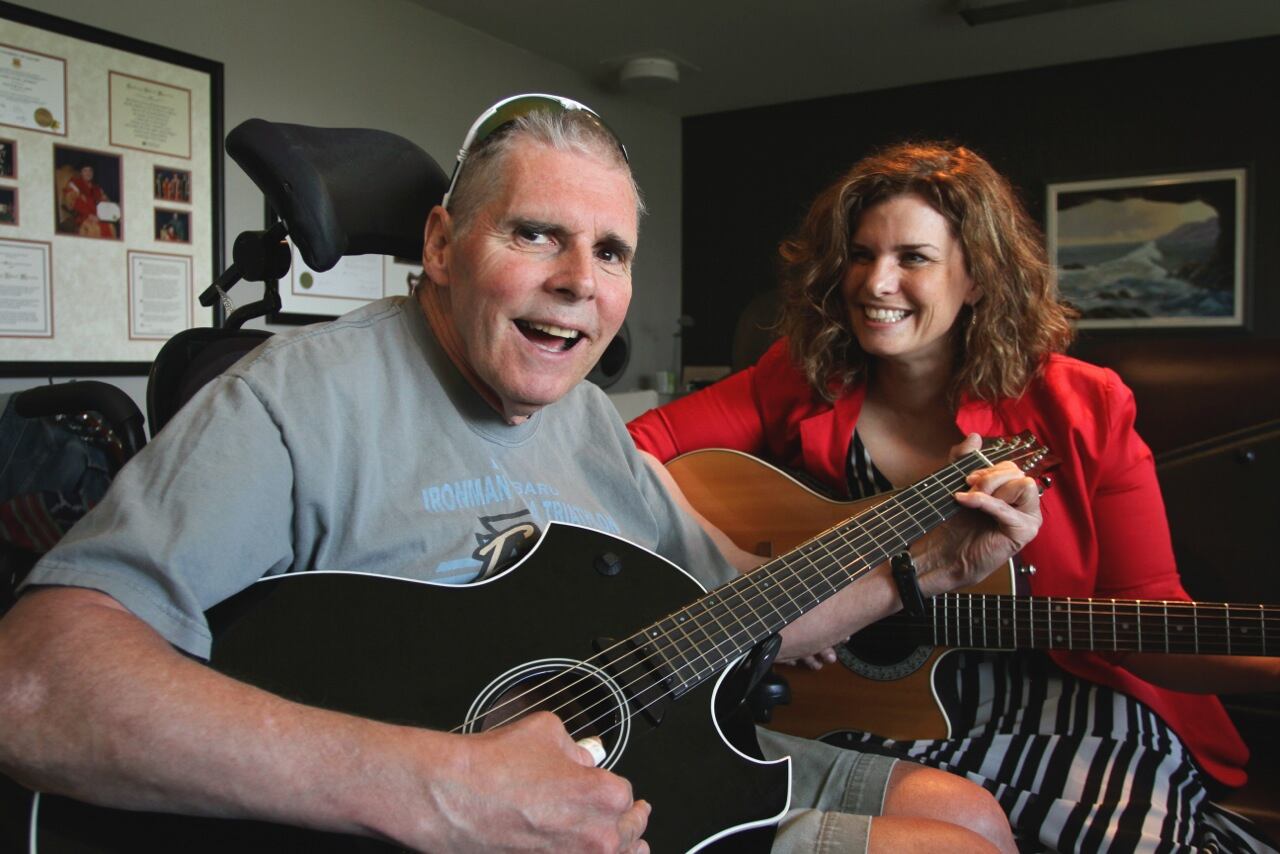Home>Events & Info>Music Therapy>How Does Music Therapy Affect The Brain


Music Therapy
How Does Music Therapy Affect The Brain
Published: February 1, 2024
Discover the powerful impact of music therapy on the brain and how it can improve mental health, reduce stress, and enhance cognitive abilities. Explore the benefits of music therapy today!
(Many of the links in this article redirect to a specific reviewed product. Your purchase of these products through affiliate links helps to generate commission for AudioLover.com, at no extra cost. Learn more)
Table of Contents
Introduction
Music has been a part of human culture for thousands of years, captivating and moving us in ways that words alone cannot. Beyond its ability to entertain and evoke emotion, music also has a profound impact on our brains and overall well-being. This powerful connection between music and the human brain forms the foundation of music therapy, a holistic approach that utilizes the therapeutic benefits of music to improve physical, emotional, cognitive, and social well-being.
Music therapy is a specialized form of therapy that employs music-based interventions to address specific therapeutic goals. It is administered by trained professionals who have a deep understanding of how music can stimulate neural activity and engage various areas of the brain.
In recent years, there has been a growing body of research exploring the neurological basis of music therapy. This research provides valuable insights into how music affects the brain and supports the use of music therapy as a viable treatment option for various conditions.
In this article, we will delve into the world of music therapy and explore its effects on the brain. We will uncover how music therapy can improve cognitive function, enhance emotional well-being, promote physical rehabilitation, manage stress and anxiety, and even treat neurological conditions.
Whether you are a music lover, a healthcare professional, or simply curious about the power of music, join us on this journey as we unravel the fascinating ways in which music therapy affects the brain.
Definition of Music Therapy
Music therapy is a clinical and evidence-based practice that uses music to address the physical, emotional, cognitive, and social needs of individuals. It is delivered by trained music therapists who have a thorough understanding of music theory, psychology, and therapeutic techniques.
Music therapy sessions can take place in various settings, including hospitals, rehabilitation centers, schools, and community centers. During these sessions, the music therapist employs a range of musical activities, such as singing, playing instruments, improvising, and listening to music, tailored to the individual’s specific goals and needs.
The goal of music therapy is to utilize the unique qualities of music to support the individual’s overall well-being. It provides a safe and non-judgmental environment for expression and communication, allowing individuals to explore their emotions and experiences through music.
One of the distinguishing features of music therapy is its ability to engage multiple areas of the brain simultaneously. Music has the power to stimulate the auditory, motor, visual, and emotional centers of the brain, creating a holistic and immersive experience.
It is important to note that music therapy is different from music entertainment or music education. While music therapy can involve enjoyable musical activities, its primary focus is on achieving specific therapeutic outcomes, such as improving cognitive skills, reducing anxiety, or enhancing physical rehabilitation.
Music therapists work closely with their clients to assess their needs and develop personalized treatment plans. These plans often consist of a combination of active music-making, passive music listening, guided imagery, relaxation techniques, and verbal processing.
Research has shown the efficacy of music therapy in various clinical settings, including pediatric care, mental health treatment, pain management, rehabilitation, and palliative care. The power of music to affect mood, evoke memories, foster emotional connections, and enhance overall well-being makes it a versatile and valuable therapeutic tool.
As we delve deeper into the neurological basis of music therapy in the following sections, we will gain a deeper understanding of how this unique form of therapy affects the brain and why it has gained recognition as a valuable treatment modality.
The Neurological Basis of Music Therapy
To truly appreciate the effects of music therapy on the brain, it is essential to understand the neurological mechanisms that underlie our response to music. Music has a profound impact on the intricate network of brain regions involved in perception, emotion, memory, and motor function.
When we listen to music, our auditory cortex processes the sound waves and decodes them into meaningful patterns of pitch, rhythm, and melody. This sensory information then travels to different regions of the brain, including the limbic system, which is responsible for our emotions and memories.
Notably, music activates the release of dopamine, a neurotransmitter associated with feelings of pleasure and reward. This activation of the brain’s reward system may explain why music can elicit strong emotional responses and create a sense of well-being.
Music also has a unique ability to engage our motor system. When we tap our foot, sway to the rhythm, or play an instrument, our brain’s motor cortex is activated, coordinating our movements in time with the music. This interaction between music and the motor system forms the basis of rhythm-based interventions in music therapy.
Furthermore, research has shown that music has the power to stimulate the formation of new neural connections and promote neuroplasticity. Neuroplasticity refers to the brain’s ability to reorganize itself and form new pathways, even in response to injury or disease. Music therapy harnesses this neuroplasticity to aid in rehabilitation and cognitive enhancement.
Understanding the neurological basis of music therapy helps us grasp why music can have such a profound impact on the brain and why it is an effective therapeutic modality. By harnessing the power of music, music therapy can influence neural activity, rewire connections, and create positive changes in brain function.
In the following sections, we will explore the specific effects of music therapy on the brain and how it can be utilized to improve cognitive function, enhance emotional well-being, promote physical rehabilitation, manage stress and anxiety, and even treat neurological conditions.
Effects of Music Therapy on the Brain
Music therapy has a profound impact on the brain, eliciting a range of physiological and psychological responses. By engaging various neural networks, music therapy can improve cognitive function, enhance emotional well-being, promote physical rehabilitation, manage stress and anxiety, and even treat neurological conditions.
One of the key effects of music therapy is its ability to improve cognitive function. Research has shown that music activates brain areas associated with attention, memory, and executive function. Engaging in active music-making tasks, such as playing an instrument or singing, can enhance cognitive skills such as focus, attention span, and information processing. Additionally, music therapy has been found to be effective in aiding memory retrieval and improving verbal and non-verbal communication skills.
Emotionally, music has a profound impact on our well-being. Music therapy can help individuals express and process difficult emotions, reducing stress and enhancing mood. Listening to preferred music or participating in music-making activities can boost positive emotions, release tension, and promote relaxation. It can also foster emotional connections and promote social bonding, creating a sense of belonging and support.
In terms of physical rehabilitation, music therapy can greatly aid in motor skills development, coordination, and balance. Rhythm-based interventions, such as drumming or dance, can improve movement and motor control. Additionally, music therapy has shown promising results in helping individuals with motor disorders, such as Parkinson’s disease, regain mobility and improve overall physical function.
For individuals experiencing stress, anxiety, or trauma, music therapy provides an effective means of relaxation and emotional release. Listening to calming music or engaging in guided imagery exercises can help reduce stress levels, regulate heart rate and blood pressure, and promote a sense of calmness and peace. Furthermore, music therapy has been utilized in various healthcare settings to alleviate pain and discomfort and provide comfort during medical procedures.
Music therapy has also been found to be beneficial in treating neurological conditions. For example, in individuals with autism spectrum disorder, music therapy can enhance communication skills, social interactions, and self-expression. In individuals with Alzheimer’s disease and other forms of dementia, music therapy has shown positive effects on memory recall, mood, and overall quality of life.
Overall, music therapy engages multiple areas of the brain and elicits a wide range of effects, making it a valuable therapeutic approach for individuals of all ages and abilities. Its ability to stimulate neural activity, promote neuroplasticity, and evoke emotional responses demonstrates its potential in enhancing overall well-being and treating various conditions.
In the next sections, we will explore in more detail how music therapy can specifically improve cognitive function, enhance emotional well-being, promote physical rehabilitation, manage stress and anxiety, and treat neurological conditions.
Improving Cognitive Function
Music therapy has been shown to have a positive impact on cognitive function, encompassing areas such as attention, memory, executive function, and information processing. Engaging in music-making activities and listening to music stimulates various brain regions associated with these cognitive processes.
One of the ways in which music therapy improves cognitive function is through attention enhancement. Playing an instrument or actively participating in music-making requires focused attention. This focused attention can carry over to other tasks, improving concentration and reducing distractions. Moreover, rhythmic elements in music help regulate attention, aiding individuals with attention deficit disorders or difficulties in sustaining attention.
Memory is another cognitive function that can be improved through music therapy. Music has the ability to evoke emotional memories, tapping into our autobiographical memory networks. This connection between music and memory is harnessed in therapeutic interventions for individuals with memory impairments, such as those with Alzheimer’s disease or traumatic brain injuries. By engaging with familiar music or creating personalized playlists, music therapy helps individuals access memories, stimulate reminiscence, and enhance overall memory abilities.
Executive function skills, including planning, problem-solving, decision-making, and organization, can also be enhanced through music therapy. Music engages the prefrontal cortex, the region of the brain responsible for executive functions. Incorporating structured musical activities, such as improvisation or composing, challenges individuals to think critically, make decisions in real-time, and apply problem-solving strategies.
Furthermore, music therapy can enhance information processing abilities. The rhythmic and melodic elements in music engage multiple sensory channels simultaneously, stimulating cognitive processes involved in perception and processing of auditory information. This multisensory engagement can improve cognitive processing speed, auditory discrimination, and pattern recognition.
In addition to the direct effects on cognitive function, music therapy can also improve communication skills. Music, with its rhythmic and melodic patterns, can help individuals develop and practice language skills, including speech production, rhythm, and intonation. Singing and incorporating lyrics into therapeutic interventions can support language development and communication for individuals with speech and language disorders.
Overall, music therapy provides a unique and effective means of improving cognitive function. By harnessing the power of music to engage various areas of the brain, music therapy enhances attention, memory, executive function, information processing, and communication skills. It offers a creative and engaging approach to cognitive rehabilitation and enhancement for individuals of all ages and abilities.
In the following sections, we will explore how music therapy can enhance emotional well-being, promote physical rehabilitation, manage stress and anxiety, and treat neurological conditions.
Enhancing Emotional Well-being
Music therapy has a profound impact on emotional well-being, offering a powerful and expressive outlet for individuals to explore and process their emotions. The emotional effects of music therapy are rooted in the way music engages the brain’s limbic system, which plays a vital role in our emotions and memories.
Listening to music has the power to evoke a wide range of emotions, from joy and excitement to sadness and tranquility. Preferred music can elicit positive emotions and boost mood, while calming or soothing music can help alleviate stress and promote relaxation. Music has the ability to bypass rational thinking and connect with our deepest emotions, providing a means of expression and release.
Active music-making in music therapy also contributes to emotional well-being. Playing an instrument or participating in group musical activities fosters a sense of accomplishment and self-expression. It allows individuals to channel their emotions into the creative process, providing a cathartic and empowering experience.
Furthermore, music therapy promotes emotional connections and social bonding. Engaging in music-making as a group creates a shared experience and a sense of belonging. This shared experience can foster empathy, encourage communication, and enhance social connections. Music therapy groups provide a supportive and non-judgmental environment where individuals can express themselves and build meaningful connections with others.
For individuals experiencing trauma or grief, music therapy can provide solace and aid in the healing process. Music has the ability to tap into deeply-held emotions and serve as a vehicle for emotional expression. Therapeutic songwriting or using music as a soundtrack for guided imagery exercises can allow individuals to process their emotions, gain insight, and find catharsis.
Music therapy also holds promise in addressing mental health conditions such as depression and anxiety. Research has shown that music therapy interventions can reduce symptoms of depression and improve overall mood. It provides a creative and non-verbal means of communication, allowing individuals to express emotions that may be difficult to articulate through words alone.
Overall, music therapy is a powerful tool for enhancing emotional well-being. It offers individuals a means of expression, release, and connection. By engaging with music, individuals can experience a range of emotions, find comfort and solace, and develop a sense of empowerment. Music therapy provides a safe and supportive environment to explore and embrace emotions, fostering emotional well-being in a unique and impactful way.
In the next sections, we will explore how music therapy can promote physical rehabilitation, manage stress and anxiety, and treat neurological conditions.
Promoting Physical Rehabilitation
Music therapy is a powerful tool for promoting physical rehabilitation and aiding in the recovery process. Engaging in music-making activities can enhance motor skills, coordination, balance, and overall physical functioning.
Rhythm-based interventions play a crucial role in physical rehabilitation through music therapy. The rhythmic elements in music provide a structured framework for movement and can help individuals improve their motor control and coordination. Drumming, for example, requires precise hand-eye coordination and the synchronization of different body parts. By engaging in drumming activities, individuals can strengthen motor skills and improve their ability to execute coordinated movements.
Dance and movement-based interventions in music therapy also improve physical functioning. Dance incorporates various movements and postures that promote flexibility, balance, and muscle strength. It can be particularly beneficial for individuals undergoing rehabilitation after neurological conditions, such as stroke or brain injury, as it encourages the rewiring and reestablishment of neural pathways.
Music therapy interventions also aid in improving gait and walking abilities. Rhythmic auditory stimulation (RAS) involves coordinating one’s movements with rhythmic auditory cues, such as a metronome or music. This technique has been shown to improve walking speed, stride length, and overall gait quality in individuals with mobility impairments.
Additionally, music therapy can be utilized in pain management and physical discomfort. Music has the ability to distract from pain sensations, reduce anxiety, and induce relaxation. By incorporating calming music and relaxation techniques, music therapy can alleviate physical tension and promote a sense of well-being.
Music therapy is also effective in helping individuals with neurological conditions regain motor function. For instance, individuals with Parkinson’s disease may experience difficulty with movement due to a decrease in dopamine production. Rhythmic auditory stimulation (RAS) in music therapy can help regulate movement, improve motor coordination, and enhance overall mobility.
Furthermore, music therapy promotes motivation, engagement, and adherence to rehabilitation programs. The enjoyable and stimulating aspects of music-making activities can enhance individuals’ motivation to participate in therapeutic exercises and increase their overall engagement with the rehabilitation process.
Overall, music therapy provides a holistic and enjoyable approach to physical rehabilitation. By utilizing the rhythmic and melodic components of music, music therapy enhances motor skills, coordination, balance, and physical functioning. It plays a valuable role in helping individuals recover and regain physical abilities in a creative and motivating manner.
In the next sections, we will explore how music therapy can manage stress and anxiety, treat neurological conditions, and provide therapeutic benefits for individuals of all ages and abilities.
Managing Stress and Anxiety
Music therapy is a powerful tool for managing stress and anxiety, providing a soothing and calming effect on the mind and body. The therapeutic elements of music can reduce physiological arousal, regulate emotions, and promote relaxation.
Listening to calming music has been shown to have a direct impact on the autonomic nervous system, reducing heart rate, blood pressure, and cortisol levels. Soft, melodic tunes can induce a sense of relaxation and tranquility, allowing individuals to unwind and alleviate stress. Incorporating music into daily routines or creating personalized playlists can serve as a form of self-care and stress management.
Engaging in music-making activities also has a beneficial impact on stress and anxiety. Participating in active music-making requires focused attention, which helps divert attention away from stressors and promotes a state of flow. Playing an instrument, singing, or engaging in improvisation can be a cathartic and expressive outlet for emotions, providing a sense of relief and release.
Guided imagery exercises with music can also aid in anxiety management. By using music as a backdrop, individuals can visualize calming and positive imagery, allowing the mind to relax and escape stressors temporarily. This combination of music and imagery provides a powerful tool for stress reduction and relaxation.
Music therapy group sessions can also provide a supportive and nurturing environment for individuals experiencing stress and anxiety. Group music-making activities foster a sense of connection and social support, promoting a sense of belonging and reducing feelings of isolation. Sharing experiences and emotions through music can create a sense of unity and understanding among group members.
Music therapy has been particularly beneficial for individuals with anxiety disorders. The rhythmic and predictable nature of music provides a grounding effect, helping to regulate breathing patterns and induce a sense of calmness. Music therapy interventions that emphasize deep breathing techniques alongside music can help individuals manage anxiety symptoms and enhance overall well-being.
Additionally, music therapy has shown promising results in healthcare settings, including hospitals, where patients often experience high levels of stress and anxiety. Music interventions in these settings, such as live music performances or personalized music playlists, provide comfort, distraction, and emotional support, helping to create a more relaxed and healing environment.
In summary, music therapy offers a powerful means of managing stress and anxiety. Whether through listening to calming music, engaging in active music-making, or participating in group sessions, music therapy provides a therapeutic outlet for individuals to reduce physiological arousal, regulate emotions, and promote relaxation. The combination of music’s soothing qualities and the therapeutic guidance of a music therapist can significantly contribute to stress reduction and overall emotional well-being.
In the next section, we will explore how music therapy can be utilized in the treatment of neurological conditions.
Treating Neurological Conditions
Music therapy has shown great promise in the treatment of various neurological conditions, providing therapeutic benefits for individuals with disorders such as autism spectrum disorder, Parkinson’s disease, stroke, and traumatic brain injury.
For individuals with autism spectrum disorder (ASD), music therapy can be particularly beneficial. Music’s multi-sensory nature engages individuals with ASD, helping them develop social and communication skills. Through structured music activities, such as singing, playing instruments, and movement, music therapy promotes self-expression, emotional regulation, and social interactions. It provides a safe and non-threatening environment where individuals with ASD can engage and connect with others, promoting their overall well-being.
Individuals with Parkinson’s disease often experience motor impairments, including rigidity and bradykinesia. Music therapy interventions, particularly rhythmic auditory stimulation (RAS), can improve gait, balance, and overall motor control. The rhythmic cues in music facilitate movement and can help individuals with Parkinson’s disease overcome freezing episodes. Music therapy also provides emotional support and motivation, contributing to the overall management of the disease.
Stroke survivors commonly face challenges in motor functioning and speech production. Music therapy helps in neurorehabilitation by facilitating movement, improving coordination, and enhancing speech and language skills. Rhythmic elements in music provide an external cue for movement, supporting the relearning of motor skills. Moreover, melodic intonation therapy, a specialized technique in music therapy, aids in rehabilitative efforts by utilizing the musical elements of melody and rhythm to promote verbal fluency in individuals with aphasia.
Traumatic brain injury (TBI) can result in a range of physical, cognitive, and emotional impairments. Music therapy offers a holistic approach to TBI rehabilitation, addressing motor functioning, cognitive skills, emotional expression, and social integration. Music-based interventions help improve coordination, attention, memory, and overall cognitive function. Additionally, participating in music-making activities encourages emotional expression and offers a meaningful outlet for individuals with TBI.
Music therapy has also demonstrated benefits for individuals with dementia, assisting in memory recall, cognitive functioning, and emotional well-being. Music has a unique ability to evoke memories and emotions, even in individuals with advanced dementia. Music therapy interventions, such as personalized playlists or group singing sessions, tap into the individual’s preserved musical memory, providing comfort, reducing anxiety, and enhancing overall quality of life.
Overall, music therapy provides a valuable treatment approach for individuals with neurological conditions. By harnessing the power of music, music therapy helps improve motor skills, enhance cognitive function, promote emotional well-being, and foster social connections. It offers a holistic and enjoyable approach to rehabilitation and management of neurological conditions.
As we conclude this article, we have explored the various ways in which music therapy affects the brain and how it can be utilized to improve cognitive function, enhance emotional well-being, promote physical rehabilitation, manage stress and anxiety, and treat neurological conditions. The therapeutic qualities of music, combined with the expertise of music therapists, make music therapy a valuable and effective treatment modality for individuals of all ages and abilities.
Conclusion
Music therapy is a powerful and evidence-based approach that harnesses the therapeutic benefits of music to improve physical, emotional, cognitive, and social well-being. It engages multiple areas of the brain, stimulating neural activity, promoting neuroplasticity, and evoking emotional responses.
Throughout this article, we have explored the effects of music therapy on the brain. We have seen how music therapy improves cognitive function, enhancing attention, memory, executive function, and information processing. It has the ability to promote emotional well-being, offering a means of expression, connection, and stress reduction. Music therapy also plays a significant role in physical rehabilitation, aiding motor skills development, coordination, balance, and overall physical functioning. Moreover, music therapy shows promise in managing stress, anxiety, and treating neurological conditions such as autism spectrum disorder, Parkinson’s disease, stroke, traumatic brain injury, and dementia.
The power of music to connect with us on a deep emotional level, stimulate neural activity, and create positive changes in brain function is at the core of music therapy’s effectiveness. By utilizing music in a therapeutic setting, music therapists provide a safe and supportive environment for individuals to explore, express, and heal.
As further research continues to uncover the neurological basis of music therapy, its potential applications are expanding. Its non-invasive nature, versatility, and ability to engage individuals of all ages and abilities make it a valuable treatment option across various settings, including healthcare, education, and community programs.
In conclusion, music therapy offers a powerful and holistic approach to improving well-being and treating a wide range of conditions. Its impact on the brain is undeniable, and its ability to harness music’s therapeutic qualities creates an avenue for growth, healing, and transformation. So, whether you are a music lover seeking personal growth, a healthcare professional exploring new therapeutic tools, or an individual seeking support for specific needs, music therapy may just be the harmonious path to overall well-being.











